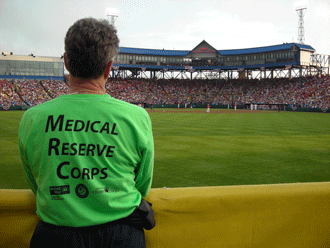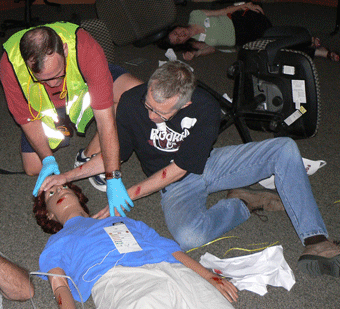|
It was only a drill, but a very life-like one.
Real people buried themselves under office equipment and smeared what looked like blood on their faces and arms. Responders from the Medical Reserve Corps (MRC) moved about the room, assessed the severity of injuries and triaged both humans and patient simulators.
Led by Beth Beam, project coordinator for HEROES the volunteer group learned how to respond in a disaster situation as part of their MRC training.
Several UNMC health professionals are among the 500-plus members of the local MRC, dedicated to assist first responders in:
- large scale epidemics;
- bioterrorism;
- natural disasters;
- terrorist attacks;
- bomb scares; and
- bacterial assaults.
Sponsored by the U.S. Surgeon General’s office, the MRC is coordinated by the United Way of the Midlands and in affiliation with local emergency managers and the Omaha Metropolitan Medical Response System.
 |
Active MRC volunteers serve during disasters and also may help with flu clinics, children’s health and immunization campaigns, health fairs, safety expos and patient education. They also assist first responders at the College World Series first aid stations. |
“I was feeling helpless and knew I needed to pair up with an organization to be on a team that was prepared to help,” she said.
Beam believes the MRC is key to an immediate response in the event of an emergency.
“You can have a roomful of doctors, but if they don’t have a way to respond, they may all just stand there,” she said. “If the world is falling apart, people don’t want to wait for responders to show up, they expect an immediate response.”
 |
MRC volunteers are taught how to medically respond to disasters, as well as trained to deal with concerned family members of victims. |
Active MRC volunteers serve during disasters and also may help with flu clinics, children’s health and immunization campaigns, health fairs, safety expos and patient education. They also assist first responders at the College World Series first aid stations.
Inactive volunteers only serve during disasters.
Requirements for both active and inactive volunteers include:
- current licenses or certificates in their profession;
- free disaster training through quarterly classes;
- participation in a disaster training drill and specific training for the different emergency volunteer positions; and
- certifications in CPR, first aid, and course work in blood borne pathogens and standard precautions (free training provided).
There’s no pressure for a volunteer to help at every event, Beam said. Volunteers are scheduled on an ‘as available’ basis. The required training, which counts toward continuing education, also is flexible. Several sessions, as well as online courses, are offered.
For more information, contact Tom McMahon at tmcmahon@UWMidlands.org or 522-7970.